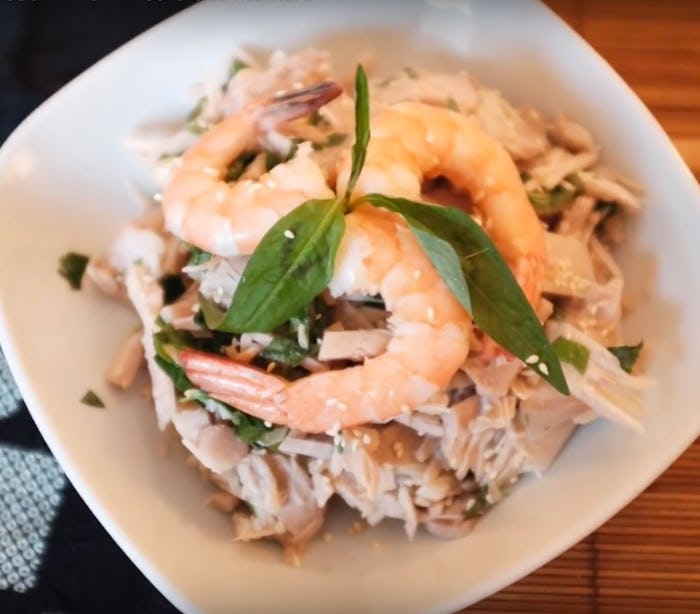As most moms know, replenishing, reenergizing, and beginning the work of physically healing your body after having a baby is no overnight endeavor. And, in many Asian cultures, the process requires an entire month of relaxation and confinement literally called "sitting the month" in Chinese and "lying in a nest" in Vietnamese, according to NPR. Technically, the practice is governed by strict, often maddening rules (imagine not being permitted to shower for 30 days). But, at the heart of it, it's the specific Asian recipes that are rumored to help moms recover from childbirth.
These recipes generally endure through oral tradition, with grandmothers and aunts often preparing them as a way to pamper new moms. But a project from the University of California at Berkeley is preparing to distribute the traditions of Vietnamese, Chinese, Korean, Hmong, Cambodian, and Filipino cultures in English, according to NPR. A group of undergraduates and a professor worked to record the recipes, often by talking with their own family members, to include them in the cookbook From Mothers to Mothers: A Collection of Traditional Asian Postpartum Recipes. It will be out and available for purchase this month.
And from Korean seaweed soup to Cambodian caramelized pork belly and Talia clams with tomatoes and ginger — or perhaps the comfort and sense of community that comes with their preparation — many believe they really do help in the recovery process.
Braising pigs' feet with ginger, for example, very possibly actually enhances the dish's nutritional value, Dr. Marilyn Wong, who teaches a course in Asian American and Pacific Islander community health and co-edited the cookbook, told NPR. "The vinegar probably leeches out the calcium from the bones. That's what you need, the calcium," she said. "Women will have loss of bone mass from breastfeeding. In the old times, they could not verbalize it that way, but they knew that women who did this did better than women who didn't."
Sharline Chiang, subscribed to the food aspect of zuo yeuzi, as the postpartum month of confinement is called, after her daughter was born. A California resident, she wrote in a first-person piece for KQED that eating nothing but the traditional food provided by a delivery service reminded her of the food she ate as a child visiting family in China and Taiwan, helped her connect with her own mother and heritage, and — perhaps most importantly — gave her an excuse not to cook for an entire month.
"That mix of nostalgia, both real and imagined, stayed with me," Chiang wrote. "Every so often, as I inhaled my food post-breastfeeding in my Berkeley home, I imagined the women before me devouring similar textures and tastes during this special time in their lives."
Chiang opted to disregard many of the more arduous rules associated with zuo yuezi, which include "sponge baths instead of showers (to reduce the chance of catching a chill), no books in case reading strains the eyes, and no movies in case sad scenes upset you and disrupt your flow of chi," Amely Greeven wrote for The Tot. It's all supposed to leave the mother beautiful and rejuvenated. Khanh-Hoa Nguyen, who is Vietnamese and helped to edit From Mothers to Mothers, told NPR that eating the traditional foods — like green papaya and pigs' feet soup — helped her own sister with breastfeeding after she had a baby.
Chinese medicinal tradition says that "confinement foods primarily serve to nourish and replenish the blood and give the body more yang, or warmth, through 'warm' foods," Chiang wrote. So, ingredients like Chinese angelica root (dang gui), red beans (adzuki), and sesame oil are believed to provide warmth, while pigs' feet, peanuts, and papaya help with the production of breast milk, and liver helps to replace blood lost as the result of childbirth.
The UC Berkeley team plans to distribute copies of Mothers to Mothers to Bay Area clinics and nonprofit groups serving low-income Asian Americans. And having many of these recipes down in one book will surely help more people to benefit from them and for the traditions to live on.
